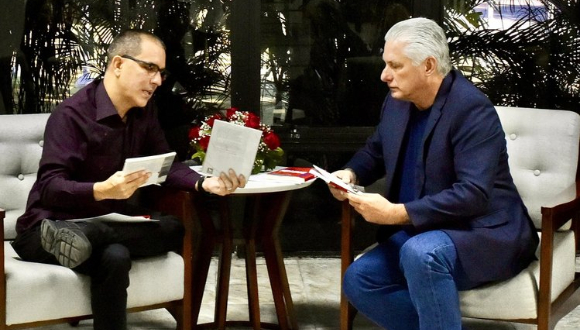
Havana, Jan 31. - While meeting at the Convention Palace on the second day of the 6th International Conference For the Balance of the World, which has convened in Havana some 700 delegates from 98 countries, and more than 400 participants from Cuba, the President of the Republic, Miguel Díaz-Canel Bermúdez, met with several of those people who distinguish this edition of the world forum dedicated to Apostle José Martí.
The president received Jorge Arreaza, executive secretary of ALBA-TCP, with whom he discussed the working priorities of this important integration mechanism, founded by Fidel and Chávez. The head of State valued the current secretariat as a stronghold, and outlined the island's continued support for the alliance that brings together Cuba, Venezuela, Nicaragua, Bolivia, Dominica, Antigua and Barbuda, Saint Vincent and the Grenadines, Saint Vincent and the Grenadines, Saint Kitts and Nevis, Grenada and Saint Lucia.
Both agreed on the idea of boosting ALBA, and returning, Arreaza said, to the levels of social policies that were experienced in previous years. They talked about the Agroalba project, which aims at food sovereignty in the region, and others that might arise related to cultural, sporting and knowledge exchanges.
On Wednesday, Díaz-Canel also met with the Argentine intellectual Atilio Borón, with whom he talked about the challenges of the Latin American left and the need for unity, in the midst of the onslaught of fascism with the new administration of the U.S. government. They talked about global solidarity with Cuba, the country's harsh situation due to the renewed embargo policy and the resilience of the Cuban people.
He also met with José Luis Centella, president of the Communist Party of Spain, and then Peter Mertens, secretary general of the Belgian Labour Party, both with a long friendly relationship with the Cuban Revolution. At the two meetings, the conversation was marked by the prospects of relations between political organizations and the need to face common for peace and war and the fascist policies that are prevailing in the world today.
The representative of the Japanese organization Soka Gakkai, Yoshiyuki Nagaoka, was also received by Díaz-Canel on this day, shortly after giving a lecture at the event on artificial intelligence. The head of state thanked him for his presence at this world event and recalled the historic relations of the Japanese organization and Cuba, promoted by Commander-in-Chief Fidel Castro Ruz.
Soka Gakkai is an organization present in 192 countries and territories, whose objective is to promote peace, culture and education, based on the philosophy of respect for the dignity of life, proclaimed by Buddhism.
The president also received George Katrougalos, an expert from the UN Human Rights Council, who was grateful for his support in the island's fight against the U.S. blockade and against inclusion in the fraudulent list of countries sponsoring terrorism. Díaz-Canel underlined Cuba's commitment to respect for human rights, and the readiness to continue to cooperate on this important issue.
Katrougalos referred to his friendly relationship with the Caribbean country, recalled his participation in the fight for the return of the five Cubans unjustly imprisoned in the United States, and referred to Cuba's work at the United Nations, where it is considered a diplomatic power, he said.
At the end of the day, the president met with the former president of Guyana, Donald Ramotar, a space in which there was talk of the endearing relationship between the two countries and cooperation in various sectors. In all these meetings, Díaz-Canel was accompanied by Roberto Morales Ojeda, Secretary of Organization of the Central Committee, and Emilio Lozada García, head of his Department of International Relations.
The sessions of the Sixth International Conference For the Balance of the World continue on Thursday, and it is expected, according to the agenda, that the Cuban head of state will exchange with other delegates of the event. (Text and Photo: Presidency Cuba)